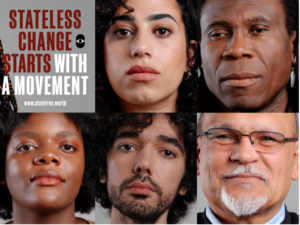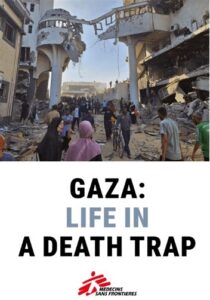Note from the Editors: The Bulletin of the Global Network of Psychologists for Human Rights (GNPHR) contains articles, events and news about the domain where psychology and human rights intersect with information gathered from many sources and reflecting many opinions. The goal is to stimulate reflection, discussion, and informed dialogue.The information publicized does not imply that the GNPHR as a network, the GNPHR Steering Committee as a committee, or the individual subscribers share the views and beliefs expressed.

January 2025
Season’s Greetings from the Steering Committee of the GNPHR
We wish you a new year filled with peace and hope for humanity.

Table of Contents
SPECIAL COMMEMORATIVE DAYS – UN
Special UN Days for January 2025 include:
- January 24 – International Day of Education
- January 27 – International Day of Commemoration in Memory of Victims of the Holocaust
GNPHR NEWS AND EVENTS
GNPHR Network of HR Groups in Psychology Associations
As part of its regular activities, the Network of HR Groups in Psychology Associations requests Update Reports from its members. These are posted on the Network’s web page.
Recent Report: Human Rights at the American Psychological Association, Gabe Twose
Summary: APA explicitly states that human rights are central to the Association’s mission. This article provides select examples of the ways in which the Association advances human rights that complement additional pathways such as publishing human rights-relevant research, promoting psychological ethics, and advancing Equity, Diversity, and Inclusion, to name a few. Psychology and human rights are inextricably interlinked, and professional associations have a responsibility to ensure the linkages are acknowledged, cultivated, and utilized to ensure our science and practice are employed to benefit the global community.
This report highlights APA’s commitment to human rights in its strategic plan, Council policies, and advocacy actions. It provides links to recent policy resolutions on the global human rights of women and girls, an immediate, permanent, and comprehensive ceasefire in the Israel-Gaza conflict, restitution and reparations for the survivors of individual and collective trauma and their descendants, and immigrant health. It outlines staff and member advocacy on priorities including expanding access to psychological services, supporting integrated health care, protecting investments in the psychology workforce, research, and education, and promoting health equity and human rights, as well as work at the United Nations, such as recently submitted comments explaining how professional organizations can advance normative and policy measures to advance the human rights of persons with psychosocial disabilities and current or potential users of mental health services, and an APA-organized celebration of World Mental Health Day, Moving from Words to Action: Implementing the General Assembly Resolution (A/77/300) on Mental Health and Psychosocial Support (see a video recording on UNWebTV). Co-hosted with the Permanent Missions to the UN of Mexico, Belgium, Romania, and Kuwait, as well as the World Health Organization, UNICEF, and several NGO partners, the event featured comments from UN and civil society actors on mental health as a human right and the importance of the mental health Resolution being applied at national levels by governmental and civil society stakeholders.
Webinar Series Human Rights Education
Next Webinar in February 2025
Mental Health and Human Rights in Ghana
For past Webinars, see: https://humanrightspsychology.org/webinars/
CONTENT AREAS AND NEWS
General
What Does Social Justice Really Mean for Psychologists? Zenobia Morrill, Mad in America, SCIENCE, PSYCHIATRY AND SOCIAL JUSTICE. September 24.
Without clarity and consensus around what social justice means, psychologists risk perpetuating injustices that undermine their stated mission.
In a new article, published in the Journal of Theoretical and Philosophical Psychology, scholars Erin Thrift and Jeff Sugarman present a thoughtful analysis of the term social justice and its use in the field of psychology. They outline the term’s multifaceted and complex history, illustrating that its usage today by psychologists may be reductive and problematic.
“History should give pause to psychologists who claim social justice as their mission,” Thrift and Sugarman write. “Social justice has become a ‘cultural keyword’ and, consequently, whether psychologists realize it or not, invoking the term thrusts them and the discipline into a broader debate about human freedom, individual and collective responsibility, and the role of the state.”
The meaning of the term “social justice,” in Western, democratic states, has shifted throughout history. It has transformed alongside cultural developments and milestones and has garnered increased attention in recent years. Thrift and Sugarman point out that the definition of social justice lacks specificity, clarity, and consensus. Nevertheless, the field of psychology has aligned itself with a social justice mission, leaving some to wonder what exactly that mission means and entails.
See also:
Scientific research illuminating the mental health impacts of racism and discrimination and more. Highlights of peer-reviewed studies in psychology and related fields.
The Social Justice page of the National Association of School Psychologists,
Open Society Reaffirms Its Commitment to Human Rights.
December 10, 2024
NEW YORK—On International Human Rights Day, the Open Society Foundations reaffirm their vision for a shared humanity where everyone can thrive, continuing the philanthropy’s role as the world’s largest private funder promoting rights, equity, and justice.
As the world faces rapidly evolving challenges and increasing threats to core open society values, Open Society made several multiyear commitments in 2024 to support a broad range of critical human rights actors at all levels from community-based activists to national, regional, and international human rights groups.
Open Society will also forge strategic relationships with values-aligned governments, multilateral bodies, and other nontraditional partners that demonstrate leadership, promote accountable institutions, and advance far-sighted ideas.
Under the leadership of Chair Alex Soros, the philanthropy is streamlining its programming to support new voices and approaches that align with today’s emerging forms of organizing and leadership. The Foundations will pursue targeted time-bound efforts, provide long-term institutional support, and retain the flexibility to respond to crises through rapid response.
Climate Justice
Exploring Climate Activism in Clinical Psychology. Charlotte L. Hopkins, University of Leeds, 2024.
As the climate and ecological emergency (CEE) intensifies, global mitigation efforts fall far short of what is needed to shield us from its impacts. The impact of this on mental health is broad and far reaching, including existential dread, post-traumatic responses to extreme weather events, and distress linked to displacement and conflicts related to increased climate pressures. This constitutes a mental health emergency and increasingly, the mental health community are being called upon to act. Environmental activism has long been a central component in terms of challenging governments and businesses who are culpable for environmental destruction. Much like some doctors, who have recognised the physical health implications of the CEE and felt called to act, some clinical psychologists are recognising the mental health implications of the CEE as a call to action. Some evidence exists of narratives around clinical psychology which are at odds with activism, such as ideas of being publicly neutral or apolitical, or a prevailing notion of professionalism. Method: Nine clinical psychologist climate activists participated in semi-structured interviews about the intersections of their climate activism and their profession. Reflexive Thematic Analysis was used to explore participant responses. Results: Five themes with a total of 17 sub-themes were identified. Two themes related to the context of participants’ activism, namely The Nature of the Climate Crisis and the Imperative to Act and Reflections on Being a Clinical Psychologist, whereas three further themes explored the intersection of clinical psychology and climate activism. Participants spoke about Power, The Institutions of Clinical Psychology and the Climate Crisis, in which they described how clinical psychology is ideologically tied to neoliberal capitalism and how this supresses action on climate. Participants also spoke about the ways in which Clinical Psychology and Climate Activism Clash and Cohere, describing a “type” of clinical psychologist who is politically disengaged and not suited to activism and the ways in which clinical psychology can feel like an alienating and isolating place for climate activists, contrasted against a sense that Clinical Psychologists Should be Natural Activists, speaking to a shared ethical root between climate activism and clinical psychology, and a wealth of transferrable skills. Discussion: Results are placed in historical and current context, attempting to draw a range of practical suggestions for action at the level of the individual, within training programmes and within the institution around clinical psychology. Future directions for research are discussed.
Crimes against humanity
National Security Archive Publishes Key Records on Infamous MKULTRA Program.
Agency Sought Drugs and Behavior Control Techniques to Use in “Special Interrogations” and Offensive Operations
Sidney Gottlieb’s CIA Personnel File, 1983 Deposition Testimony, Among Newly Available Documents
Washington, D.C., December 23, 2024 – Today, the National Security Archive and ProQuest (part of Clarivate) celebrate the publication of a new scholarly document collection many years in the making on the shocking secret history of the CIA’s mind control research programs. The new collection, CIA and the Behavioral Sciences: Mind Control, Drug Experiments and MKULTRA, brings together more than 1,200 essential records on one of the most infamous and abusive programs in CIA history.
Under code names that included MKULTRA, BLUEBIRD and ARTICHOKE, the CIA conducted terrifying experiments using drugs, hypnosis, isolation, sensory deprivation, and other extreme techniques on human subjects, often U.S. citizens, who frequently had no idea what was being done to them or that they were part of a CIA test.
Democracy and Human Rights
Politicians’ ‘inflammatory language’ part of failure to tackle extremism, UK report finds. Ben Quinn, The Guardian, December 9, 2024.
Report calls for ‘radical rethink’ of how ministers approach extremism, amid risk of declining trust in democracy and institutions
Politicians have been criticised for using “inflammatory language” and peddling conspiracy theories in a report that finds government policies are failing to prevent extremism spreading and taking route in the UK.
The report from Dame Sara Khan, a former counter-extremism commissioner, urges a “radical rethink” of how ministers tackle extremism amid a “chronic risk of democratic decline” due to conspiracy theories, worsening social cohesion and other threats.
Displaced/Migrants/Refugees/Stateless
 Interview with Statefree on their 70 Years, 70 Voices campaign. 19 December 2024.
Interview with Statefree on their 70 Years, 70 Voices campaign. 19 December 2024.
Statelessness affects millions of people worldwide, yet many people have never heard of it. Beyond listening and sharing, how else can people – and organisations – be inspired to take action to help improve the lives of stateless communities?
We spoke to Noana Wilhelm, Head of Communications at Statefree – a non-profit organisation that aims to create visibility and community around the topic of statelessness, led by a community of empowered stateless people and allies.
This year marks 70 years of UNHCR’s 1954 Statelessness Convention. In recognition of this, Statefree have developed the 70 Years, 70 Voices campaign – what is the campaign about and what do you hope it will achieve?
The campaign highlights the stark reality that, despite the passage of seven decades, there has been little progress in addressing the rights of stateless people. Through the voices and personal stories of 70 stateless individuals, the campaign brings to light the often unseen experiences of our community. Their voices have been brought together by our team and in the course of the campaign they are shared in various formats, making the message accessible and impactful for a wide range of audiences. As an extension, we spread knowledge and encourage dialogue with our “70 facts about statelessness” and “70 ways to support” formats.
Voices Against War
Middle East
 GAZA: LIFE IN A DEATH TRAP. Doctors Without Borders, December 2024.
GAZA: LIFE IN A DEATH TRAP. Doctors Without Borders, December 2024.
Executive Summary of the Report: Israel’s war on Gaza has so far killed more than 44,000 Palestinians, wounded more than 105,000 and displaced approximately 1.9 million people or 90 per cent of the population, according to the Gaza Ministry of Health (MoH). In response to the horrific attacks carried out by Hamas and other armed groups on 7 October 2023, in which 1,200 people were killed and 251 taken hostage, Israeli forces are crushing an entire population under bombs and rubble.
Médecins Sans Frontières/Doctors Without Borders (MSF) has witnessed 14 months of repeated attacks on civilians, the dismantling of essential civilian infrastructure including healthcare facilities, and a systematic denial of humanitarian assistance, seemingly underpinning Israel’s campaign to unravel the very fabric of society in Gaza. Over the first 12 monts of hostilities, MSF staff themselves have endured 41 attacks and violent incidents, including airstrikes, shelling and violent incursions in health facilities, direct fire on its shelters and convoys and arbitrary detention by Israeli forces. Eight MSF colleagues and many of their family members have been killed, many more have been injured. Medical personnel and patients alike have been forced to urgently evacuate health facilities on 17 separate occasions, often literally running for their lives. MSF has only been able to restart activities in three facilities.
Women
Double stigma among pregnant adolescents living with HIV in sub- Saharan Africa: a call to action. Ronald Olum, Noeline Nakasujja, Elvin Geng, Makerere University School of Public Health, The Lancet Global Health, Open Access, 13-1, January 2025.
Adolescent girls in sub-Saharan Africa face a substantial burden of both HIV and teenage pregnancy. In 2023, about 84% of all new HIV infections among adolescents in sub-Saharan Africa were among girls, with an estimated 750 000 adolescent girls living with HIV residing in this region.1 Similarly, there were approximately 6·4 million births among adolescents in sub-Saharan Africa,2 and an estimated adolescent pregnancy prevalence of 21·4%.3 The intersection of these issues is important, as adolescent pregnancy also increases the risk of HIV infection due to biological vulnerability and socioeconomic factors.4 Pregnant adolescents living with HIV (PALHIV) in sub-Saharan Africa are exposed to multiple unique challenges, including stigma.
HIV-related stigma, rooted in complex sociocultural beliefs and practices, often leaves PALHIV feeling isolated, discriminated against, and sometimes exposed to violence. In such settings, adolescent pregnancy, especially outside of marriage, is also stigmatised as a sign of promiscuity and a deviation from societal and cultural norms, leading to community shaming and familial rejection.5 The double stigma can have profound implications on the physical and mental health of PALHIV and can make it difficult for them to access and use health-care services effectively. As a result, PALHIV may disengage from HIV treatment and antenatal care, increasing the risk of vertical transmission and adverse birth outcomes, especially in health-care systems that primarily focus on adults.5 It can also lead to poor health outcomes for their offspring, including developmental challenges.
PUBLICATIONS
 A HUMAN RIGHTS VIEW OF THE PAST. Antoon De Baets, Cambridge University Press, Elements, 2024.
A HUMAN RIGHTS VIEW OF THE PAST. Antoon De Baets, Cambridge University Press, Elements, 2024.
This Element springs from a deep concern: Human rights are in crisis and yet their rich potential for understanding our time has not been fully explored.
Since their conceptual birth in the early Enlightenment, human rights have always been developed and defended against a background of ongoing atrocities and wars in which they were grossly violated. At the same time, conservative, liberal, and socialist thinkers argued against ascribing an abstract and absolute character to these human rights and maintained that they should be embedded in the societies in which they were exercised. After World War II – a war with unprecedented atrocities – the idea of human rights received a new impulse and, incorporating the early criticism, reinvented itself as the Universal Declaration of Human Rights of 1948, which became the flagship of a wave of human rights treaties.
Despite these impressive successes, the universality claim of human rights was regularly attacked, for example by Asian heads of state who in the 1990s defended the existence of “Asian values,”2 or in 2009–2013 when a heterogenous group of United Nations Member States launched a campaign to revalorize “traditional values.”3 In some corners of the world, autocrats and populists questioned the notion of human rights itself. Since 2015 the very idea of human rights has come under sustained attack, with someeven talking about a “post-human-rights world” and denying the validity of the notion of human rights altogether. It is a fact that the leaders of several major powers have tried to formulate alternatives to Western geopolitical dominance, alternatives in which human rights play a minor role or are replaced by regional values or raison d’état.
The Anti-Woke Academy: Dutch Far-Right Politics of Knowledge About Gender. Iris B. Segers, Cambridge University Press, 13 December 2024.
The Dutch parliamentary far right has been considered a relatively liberal outlier to the gender politics of the European far right, yet recent years have shown the increasing anti-gender mobilization of the party Forum voor Democratie(FvD). Based on a theoretical framework of anti-gender mobilization, the far right, and politics of knowledge, this article explores anti-gender politics as a form of alternative knowledge production through a qualitative content analysis of the FvD’s online presence. Through applying Verloo’s concept of the episteme, this article’s findings show that the FvD mobilizes against epistemic institutions by claiming they disseminate dangerous knowledge about gender, which they argue presents a fundamental threat to society, captured in conspiratorial terms like “transgender ideology” and “woke.” Simultaneously, the party promotes illiberal gender politics through the establishment of alternative epistemic institutions. This article shows how far-right actors may promote anti-gender politics by presenting themselves as “alternative intellectuals” who seek to carve out an epistemic niche alongside the mainstream.
RESOURCES
Academia Mental Health and Well-Being, an open-access journal broadly disseminated within the global Academia.edu network, is seeking research in Human Rights and Mental Health. Articles published with Academia.edu Journals get 4.6x more downloads after one week of publication, compared to other leading open access journals. Published articles will be disseminated to the relevant audience within Academia.edu’s 260 million researchers.
Submit an article
UPCOMING EVENTS
The International Council of Psychologists 83rd Annual Conference
JOIN the International Council of Psychologists in Rotterdam, Netherlands for its 2025 Annual International Conference!
This vibrant conference will celebrate ICP’s mission to support Human rights, Dignity, and Justice: Social Inclusion and Migration
Location: Rotterdam, Erasmus University College
Registration and Information: https://icpweb.org/icp-annual-conference/icp2025/
Convening the global sustainability community. 6–19 June 2025, Istanbul Congress Centre, Türkiye.
The Global Sustainable Development Congress brings together the world’s leading thinkers, policymakers and actors from different sectors to drive new alliances and create positive action for a more sustainable future. Over four days, keynote speakers, panellists and representatives from our track and global content partners will share their insights on health, sustainable cities, clean energy, AI, gender equality, the environment and much more.
CONTACTS: Published by the Global Network of Psychologists for Human Rights – www.humanrightspsychology.org
Disclaimer: The website of the Global Network of Psychologists for Human Rights (GNPHR) contains articles, events and news about the domain where psychology and human rights intersect. The information presented in this Bulletin, does not imply that the GNPHR shares the views and beliefs in the articles.
- @GNPHR1
- How to get involved – read how you can contribute to the global network
- Consider contributing a Blog/Commentary
- News and Bulletins from the GNPHR – Subscribe to GNPHR
- Email addresses:
Ways to Participate in Global Network Activities
- Share Your Experiences and Examples
One of the best ways to illustrate the intersection of psychology and human rights is through example. We are looking for examples of your encounters with human rights issues in your professional life. You might describe a time when you protected (or failed to protect) human rights, or advocated for what you saw as a human rights issue. The events might be in your clinical, research, academic, applied, or volunteer work. Please send your narrative / story (500-1000 words) to Marlena Plavšić (marlena_plavsic@hotmail.com). We will compile these for publication in the GNPHR Bulletin and on the website. Please also indicate if you would like your stories to remain anonymous. - Share your Expertise and Opinions
We invite you to contribute a blog or opinion piece on general human rights issues; human rights education or strategies for raising the profile of human rights within psychology or your professional life. Students are welcome to contribute, including on student needs for learning about and addressing human rights. Please contact the GNPHR Blog editor (blogeditor@humanrightspsychology.org) with ideas for the article you would like to write! - Send articles/news/events
If you come across a human rights article or news, or know of an upcoming hunman rights event, please send for publication in the Bulletin. Send to the Bulletin editor Polli Hagenaars (polli.hagenaars@gmail.com).

